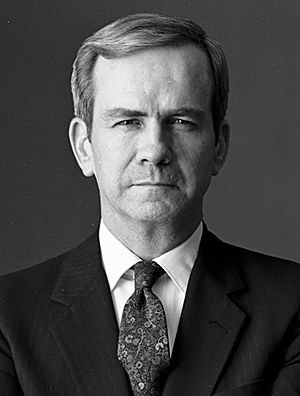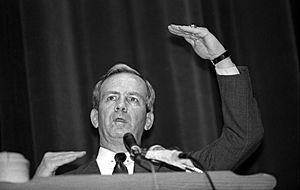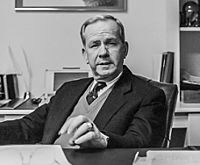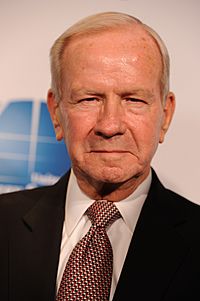Robert McFarlane (American government official) facts for kids
Quick facts for kids
Bud McFarlane
|
|
|---|---|
 |
|
| 12th United States National Security Advisor | |
| In office October 17, 1983 – December 4, 1985 |
|
| President | Ronald Reagan |
| Preceded by | William P. Clark Jr. |
| Succeeded by | John Poindexter |
| 12th United States Deputy National Security Advisor | |
| In office April 4, 1982 – October 17, 1983 |
|
| President | Ronald Reagan |
| Preceded by | James Nance |
| Succeeded by | John Poindexter |
| Counselor of the Department of State | |
| In office February 28, 1981 – April 4, 1982 |
|
| President | Ronald Reagan |
| Preceded by | Rozanne L. Ridgway |
| Succeeded by | James L. Buckley |
| Personal details | |
| Born |
Robert Carl McFarlane
July 12, 1937 Washington, D.C., U.S. |
| Died | May 12, 2022 (aged 84) Lansing, Michigan, U.S. |
| Political party | Republican |
| Spouse | Jonda Riley |
| Education |
|
| Military service | |
| Branch/service | United States Marine Corps |
| Years of service | 1959–1979 |
| Rank | |
| Battles/wars | Vietnam War |
| Awards |
|
Robert Carl "Bud" McFarlane (born July 12, 1937 – died May 12, 2022) was an Marine Corps officer from America. He became the National Security Advisor for President Ronald Reagan from 1983 to 1985.
During his time with President Reagan, McFarlane helped create the Strategic Defense Initiative. This was a plan to protect the U.S. from missile attacks. He left his role in 1985 due to disagreements. However, he continued to be involved in talks with Iran.
McFarlane was a key person in the Iran–Contra affair. This was a secret operation where the U.S. government sold weapons to Iran. The money from these sales was then secretly given to rebels in Nicaragua. When this plan became public, McFarlane admitted he had hidden information from Congress. He was later pardoned by President George H. W. Bush.
After his pardon, McFarlane started a consulting business. He passed away in Lansing, Michigan, on May 12, 2022, due to a lung condition.
Contents
Early Life and Education
Robert McFarlane was born in Washington, D.C. His father, William McFarlane, was a Congressman from Texas. After high school, Bud McFarlane went to the United States Naval Academy in Annapolis, Maryland, in 1955. He graduated in 1959.
He was the third person in his family to attend the Naval Academy. He did very well in his classes and was also good at gymnastics. In 2014, he received an honorary degree from the Institute of World Politics. He married his high school girlfriend, Jonda Riley.
Marine Corps Service
After graduating from the Naval Academy in 1959, McFarlane joined the Marine Corps. He became a second lieutenant and worked with field artillery.
During his time in the Marines, McFarlane led different groups of soldiers. He also taught about artillery. From 1968 to 1971, he helped the Marine Corps' Operations Deputy prepare for important meetings. He also worked on foreign policy for Europe, the Middle East, and Latin America.
McFarlane served two times in the Vietnam War. In 1965, he led an artillery group during the first landing of U.S. combat forces in Vietnam. He later studied strategic studies in Geneva, Switzerland.
He returned to Vietnam in 1967–1968. He helped organize fire support for soldiers during the Tet Offensive. For his brave service, McFarlane received the Bronze Star Medal and the Navy Commendation Medal.
After his time in Vietnam, he was chosen as a White House Fellow in 1971. He was the first Marine Corps officer to receive this honor. He worked in the White House Office of Legislative Affairs. Later, he became a military assistant to Henry Kissinger at the United States National Security Council.
In this role, McFarlane shared important information with China from 1973 to 1976. He also traveled with Kissinger on his trips to China. He worked on foreign policy, including relations with the Soviet Union and arms control. President Gerald Ford made him his Special Assistant for National Security Affairs. McFarlane retired from the Marine Corps in 1979 as a lieutenant colonel.
Working for the Government
In 1979, McFarlane joined the staff of the United States Senate Committee on Armed Services. He helped with discussions about the SALT II Treaty. He also helped write much of Ronald Reagan's foreign policy plans for the 1980 presidential campaign.
In 1981, President Reagan appointed McFarlane as a Counselor at the Department of State. He helped Secretary of State Alexander Haig.
In 1982, Reagan made McFarlane the Deputy National Security Advisor. His job was to combine policy ideas from different government departments. In 1983, he became the President's Special Representative in the Middle East. He worked on talks between Israel and Arab nations.
McFarlane was later appointed President Reagan's National Security Advisor. In this role, he helped create U.S. foreign and defense policy. He strongly supported the Strategic Defense Initiative (also known as "Star Wars").
The Iran-Contra Affair
The Iran-Contra affair was a secret operation. It involved selling weapons to Iran and using the money to help the Contras in Nicaragua. As National Security Advisor, McFarlane suggested that Reagan negotiate the arms deal with Iran. However, by late 1985, he advised Reagan to stop the weapon shipments. McFarlane resigned on December 4, 1985, saying he wanted to spend more time with his family.
The Iran-Contra affair became public in November 1986. In 1988, McFarlane admitted he had hidden information from Congress. He was given two years of probation and a fine. However, President George H. W. Bush pardoned him on Christmas Eve 1992.
Other Activities
After leaving government, McFarlane started an international consulting company called McFarlane Associates Inc. He also helped create IP3 International. This group works to build nuclear reactors in Saudi Arabia.
McFarlane was a member of several important groups. These included the Washington Institute for Near East Policy and the Partnership for a Secure America. He also advised John McCain's 2008 presidential campaign in 2008.
From 2009, McFarlane worked in Sudan to help with relations between different groups and development projects. Investigators looked into his work, but they did not find any criminal wrongdoing.
In July 2011, McFarlane helped create the United States Energy Security Council.
Death
Robert "Bud" McFarlane passed away on May 12, 2022, in Lansing, Michigan. He was 84 years old and died from complications of a lung condition. He lived in Washington, D.C., but was visiting family in Michigan when he died. In July 2022, the U.S. Congress honored him for his leadership.
Awards and Decorations
| Navy Distinguished Service Medal | |
| Bronze Star with Valor device | |
| Meritorious Service Medal | |
| Navy Commendation Medal with Valor device | |
| Army Commendation Medal | |
| Combat Action Ribbon | |
| Secretary of State Distinguished Service Award | |
| Secretary of the Navy Medal for Distinguished Public Service | |
 |
Presidential Service Badge |
| Alfred Thayer Mahan Award for Literary Achievement (1979) | |
| American-Swiss Friendship "Man of the Year" Award (1985) |
See also
 In Spanish: Robert McFarlane para niños
In Spanish: Robert McFarlane para niños
- Iran–United States relations
- List of people pardoned or granted clemency by the president of the United States
 | Jessica Watkins |
 | Robert Henry Lawrence Jr. |
 | Mae Jemison |
 | Sian Proctor |
 | Guion Bluford |




